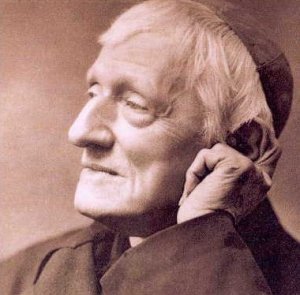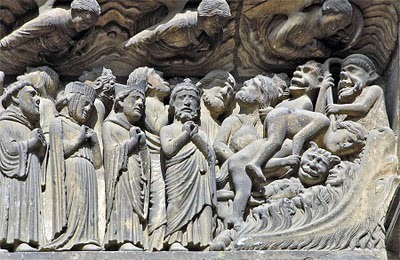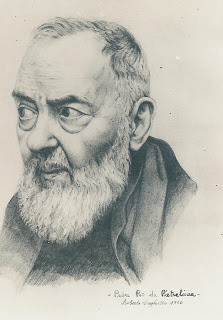Dwight Longenecker's Blog, page 340
September 24, 2011
Newman's Notes on Change

Is the Catholic Church flexible enough to change? If so, what can change and how? The Catholic Church teaches with authority, but how far does that authority go? What can the fathers of the Church change, and how? Certainly matters of discipline can be changed. Bishops can mandate a Friday fast from meat or not. The Church can dispense a married man from the vow of celibacy in order to be ordained. These, and many other matters of discipline may be altered.
The doctrinal and moral teaching of the church, however, cannot be altered. Nevertheless, our understanding of the unchanging doctrines and moral teaching of the church may develop. Because of this, in today's church some Catholics and Anglicans argue for radical change in the church's ministry, the ecclesial structures, or the church's understanding of gender roles, the definition of marriage and sexual morality because they sincerely believe in the 'development of doctrine'. So they argue: "The church used to teach that usury was a terrible sin. Now it is accepted. The church used to be in favor of slavery. Now it isn't." These are sloppy assertions--vague generalizations. In fact, the church teaching on usury past and present is far more subtle and nuanced than that. The church was against greedy and avaricious usurers--and that is still her teaching today. Here's a page that explains it. Was the church ever 'in favor of slavery'? Some popes may have owned slaves, but there is no official church teaching which condones or favors slavery, instead, the Catholic Church, from the earliest times has been one of the few voices consistently condemning slavery. Go here for an article from an Evangelical journal showing how the Catholic Church's official position has always been anti-slavery.
But I am getting off track. While these two examples are specious, they are also an attempt to show not development of doctrine, but an 'about face' by the church. It is still true that doctrine does develop and we have Blessed John Henry Newman to thank for thinking this through and setting down seven 'notes' on the development of doctrine. Newman's seven notes of a valid doctrinal development are (1) preservation of type, (2) continuity of principles, (3) assimilative power, (4) logical sequence, (5) anticipation of its future, (6) conservative action on its past, and (7) its chronic vigor. All seven of these characteristics need to be present for a doctrinal development to be valid.
The notes can be best understood with the analogy of an acorn growing into an oak tree. Newman's first note is 'preservation of type.' This just means that a validly developing doctrine does not become something essentially different. The oak tree was in the acorn all along, even though the oak tree and the acorn look completely different. On these terms one might argue that monogamy was a natural development from polygamy because it was a refinement and a focussing of what was already present in polygamy--the idea of a man and woman being faithful to one another in a marriage contract. However, Newman's first note would exclude homosexual marriage from being a valid development because two men marrying one another is not a development from the essential idea of marriage, but a radical deviation.
The second note is 'continuity of principles'. That is to say, the underlying principles of the doctrine do not change although they may flower and grow and develop. So, for example, the underlying principle of Marian beliefs is that Mary is a pure Virgin full of grace. This principle or abstract underlying belief is expounded and clarified with a developed doctrine like the Immaculate Conception. The underlying principle of marriage is the natural complementarity of the sexes within the created order for the purpose of procreation. This understanding may flower and grow (as it does in John Paul II's Theology of the Body) but the underlying principle does not change--as it would, for example in homosexual marriage.
Newman's third note is 'assimilative power'. This simply means that Catholic doctrine and teaching is alive and growing. It does not reject all innovation and fresh ideas, but studies them carefully to take on and assimilate that which is good and true as it is discovered. So, for example, with the debate on women's ordination the Catholic Church may develop new understandings and acceptance of true femininity, women's roles, thus gleaning what is good and positive from feminism. Likewise, the Catholic Church may study the rise of homosexualism with an objective eye and assimilate new understandings of same sex attraction and the value of celibate friendship.
The fourth note is 'logical sequence'. The development must develop logically from it's antecedents, and not be a logical contradiction of them. This is similar to the second note on continuity of principles, except that it looks at the actual development itself and tests it to see if the development is logical or illogical. Whether it is logical or not, of course, depends on your understanding of the core doctrine or moral teaching to start with. If, for example, you believe that marriage is only about the personal experience of 'love' and 'commitment' and nothing else, then to extend marriage to homosexual persons might be a logical development. If, however, you understand marriage as a contract between a man and a woman for the procreative and unitive functions, then the development is illogical.
The fifth is 'anticipation of it's future'. This means that the development could be seen naturally within the earlier doctrine or practice. For example, the dogma of the Immaculate Conception is naturally anticipated in the much earlier dogma of the perpetual virginity of the Blessed Virgin Mary. The Immaculate Conception is simply a deeper understanding of the already existing idea that Mary was kept pure from the stain of sin. In this sense the development can be seen to be anticipated.
The sixth: 'conservative action on it's past'. The development must conserve the past, not destroy it. That is to say, that while the development enhances and clarifies and expands the past, at the same time it conserves the past. So when considering whether a doctrinal development is valid we ask whether it destroys what went before. If it does, it is a corruption not a development.
The seventh note is 'chronic vigor'. This is simply the idea that true ideas stand the test of time. They prevail. Corruptions, heresies and half truths die out.
I'm well aware that in the debate over innovations in the church Newman's notes, rather than giving all the right answers, often only ask the right questions, but right answers cannot be arrived out without the right questions first, and this brief outline might help all of us who engage in such debates.
Published on September 24, 2011 10:47
September 23, 2011
CofE Women Watching in the Dark?
This article from the Church Times reports on a meeting of senior women clergy in the Church of England who are pressuring for women to be consecrated as bishops. What I found interesting was the acronyms of the two groups. One is called WATCH (Women and The Church) the other is called DARC (Deans, Archdeacons and Residentiary Canons) group.
What are we to make of the somewhat sinister name WATCH? Are the women, like some dog collared Fairy Hardcastles watching for anyone who steps out of line and crosses them? Are they vigilant watchwomen--alert for every infraction of their politically correct ideology? Not sure. Just asking.
For those who are unfamiliar with the complexities of Anglican hierarchy--the Deans are deans of cathedrals. The Archdeacons are sort of the equivalent of our Vicar General in a diocese, and a 'residentiary canon' is a high level cathedral-diocesan administrative post. In other words the members of DARC are the ladies most poised to wear the purple and the pointy hat once the legislation goes through. Think Episcopal ladies in waiting...Not really a public relations coup calling themselves DARC I think. Why not LITEN? (Ladies In The Episcopate Now)
Meantime ABC Rowan wants "a change of culture in which the church offers 'a prophetic theology of gender' " Not quite sure what he means here, but I think what he means is, "People in society and other Christians (who are not as brave and enlightened as we are) are still terribly old fashioned patriarchal and bigoted and oppress women and homosexuals and we need to go boldly where no others dare to go. We need to speak out against this injustice and be prophetic..."
ABC Rowan is also calling for "something more profound and prophetic: a complete reappraisal of what it means to be a bishop." Well, here at last is one thing on which we can agree...women's ordination to the episcopate is certainly a "complete reappraisal of what it means to be a bishop."
What are we to make of the somewhat sinister name WATCH? Are the women, like some dog collared Fairy Hardcastles watching for anyone who steps out of line and crosses them? Are they vigilant watchwomen--alert for every infraction of their politically correct ideology? Not sure. Just asking.
For those who are unfamiliar with the complexities of Anglican hierarchy--the Deans are deans of cathedrals. The Archdeacons are sort of the equivalent of our Vicar General in a diocese, and a 'residentiary canon' is a high level cathedral-diocesan administrative post. In other words the members of DARC are the ladies most poised to wear the purple and the pointy hat once the legislation goes through. Think Episcopal ladies in waiting...Not really a public relations coup calling themselves DARC I think. Why not LITEN? (Ladies In The Episcopate Now)
Meantime ABC Rowan wants "a change of culture in which the church offers 'a prophetic theology of gender' " Not quite sure what he means here, but I think what he means is, "People in society and other Christians (who are not as brave and enlightened as we are) are still terribly old fashioned patriarchal and bigoted and oppress women and homosexuals and we need to go boldly where no others dare to go. We need to speak out against this injustice and be prophetic..."
ABC Rowan is also calling for "something more profound and prophetic: a complete reappraisal of what it means to be a bishop." Well, here at last is one thing on which we can agree...women's ordination to the episcopate is certainly a "complete reappraisal of what it means to be a bishop."
Published on September 23, 2011 21:02
Two Dictators in Action
In an earlier post this week I commented on three fallacies which are omnipresent in our relativistic society. To borrow an image from the Holy Father--"the dictatorship of relativism" is alive and well. The three are sentimentalism, utilitarianism and politics, and two of the three are in full swing in this video.
Here we have John and Richard. What a couple of genuinely nice fellas! They are clearly devoted to one another and have had sixty one years of happiness together. Two absolutely sweet old codgers. How could anyone be so hard hearted and calloused to refuse to allow these lovable old guys to tie the knot? It just makes you angry doesn't it that people would refuse such sweet old dears (who are not doing anybody any harm) to get hitched? Well that's the sentimental argument in full swing, and I mean really full, home run hitting swing.
Now check what happens next. If you don't buy the sentimental argument; if you say, "Well, they're a couple of nice old coots, but they shouldn't get married" you will be blamed not only for not having compassion, but for being cynical about 'love'. You will be blamed for being cruel. You will be blamed for not granting these old guys the good things about their relationship. You will be blamed for thinking that they are just as awful as the gay pride bath house monsters that parade naked through the streets and commit sado masochistic sex acts on the steps of the cathedral.
But that's not what we're saying at all. We can admit that Richard and John seem to be just about as nice as can be. We can admire what seems to be a faithful friendship over the years. We can admire the fact that the loyalty of their friendship seems to outstrip lots of heterosexual couples we can think of. We acknowledge that they love each other, as only old friends can. We can admire their loyalty and love. We could even admit that, for practical reasons, they might have a legal contract which grants each other property rights on death.
Nevertheless, they can't be married because they're two men. Marriage is between a man and a woman, and we resent the dictator of sentimentalism bullying us otherwise.
The second little dictator is the political argument. See how it all ends? They smile and say winningly, "Don't we have a right to be married?" Then the clincher comes up--the slogan "Freedom to Marry Now". So the dictator of sentimentalism hands over the stage to the dictator of politics and it turns into a question of 'equality' and 'civil rights'. To deny Richard and John marriage is to be a bigot. The second little dictator of political argument is a self righteous, passive aggressive little dictator--all bluster and posturing and lecturing and hectoring and when that doesn't work, the wounded look, playing the martyr and putting on that self righteous, victim expression so beloved of the rebellious adolescent.
Once again, we don't mind sentimental and political arguments. They have their weight, as do all subjective and personal arguments. What we object to is not that there are such arguments, but that they are the only arguments, and what we have now is not only that these are the only arguments, but that those who hold them deny that there could possibly be any other arguments.
That such people wish to impose their views not only on the vast majority of unwilling United States citizens, but also think that they should impose their views despite the opinions of the vast majority of human beings around the world who are alive today--not to mention the vast majority of those human beings who have lived in every place and in every age down through history is audacious, preposterous and dictatorial in the extreme.
UPDATE: Go here for Archbishop Dolan's letter to President Obama about the administration's attack on the Defense of Marriage Act.
Published on September 23, 2011 18:24
Clarifying Marriage
Previous posts on homosexuality have raised some interesting discussions in the combox. What interests me is how some readers who are Catholic have such a non-Catholic understanding of marriage.
We are told that because George and Harry love one another and are committed to one another that this is the same thing as marriage and that they should therefore be allowed to be married.
However, romantic or erotic feelings of love are not the criteria for a valid marriage, nor are they pre-requisites. An arranged marriage in which there is no subjective erotic or romantic feelings of 'love' as popularly understood, would be a valid marriage (and if the history of humanity has anything to say about it--may end up be a very good marriage). Neither can feelings of 'love' be the sole criteria to justify for an action. Note the adulterer who ceases to 'love' his wife and leaves her because he 'loves' his mistress. Regard the ethnic cleanser who 'loves' his country so much that he kills its enemies. Don't misunderstand the argument--I'm not degrading love or saying it is a bad thing. I'm saying the romantic and erotic feelings we call 'love' are not what validates a marriage (or any other action). Moral judgements are made on more solid factors.
For Catholics, marriage is a sacramental covenant which springs from the order of creation. God created the mystery of man and woman. "For this reason a man leaves his father and mother and cleaves to his wife." The nuptial relationship is bound up in the natural complementarity of the sexes and the intimacy between man and wife is part of this profound natural order, and from this intimacy new human life is created. The commitment that is expected within this marriage is one that reflects the eternal commitment of God to his people.
Thus St Paul speaks of the love that Christ has for his church and compares it to marriage. Christ is the bridegroom and the church the bride. Christ penetrates the Church with the dart of longing love which is the Holy Spirit. From this intimate union of love a new order of creation is brought forth. Because of the eternal, life giving nature of this covenant between Christ and his Church we believe that marriage is also a life long covenant between male and female.
We should be clear about certain things: to affirm marriage in this way is (by definition) to reject homosexual unions as equivalent. Nevertheless, it is possible to affirm that two men or two women might love one another very deeply. They may have a lifelong partnership and deep commitment. That friendship and commitment may be noble and good and true and self sacrificial. This is what the church has termed 'friendship.'
However, the church has also rejected any idea that this friendship should be expressed through sodomy, and it (along with every other civilized society--even those that accepted homosexuality) have never pretended that such friendships were equivalent to marriage.
The reason people in our society push for homosexual marriage is therefore, a misunderstanding of what marriage is. Too many believe that marriage is the final culmination of a romantic and erotic relationship. They see marriage not only as a desirable contract of commitment, but most of all, they see marriage as a societal (and ultimately religious) validation of their chosen sexual behaviors.

We are told that because George and Harry love one another and are committed to one another that this is the same thing as marriage and that they should therefore be allowed to be married.
However, romantic or erotic feelings of love are not the criteria for a valid marriage, nor are they pre-requisites. An arranged marriage in which there is no subjective erotic or romantic feelings of 'love' as popularly understood, would be a valid marriage (and if the history of humanity has anything to say about it--may end up be a very good marriage). Neither can feelings of 'love' be the sole criteria to justify for an action. Note the adulterer who ceases to 'love' his wife and leaves her because he 'loves' his mistress. Regard the ethnic cleanser who 'loves' his country so much that he kills its enemies. Don't misunderstand the argument--I'm not degrading love or saying it is a bad thing. I'm saying the romantic and erotic feelings we call 'love' are not what validates a marriage (or any other action). Moral judgements are made on more solid factors.
For Catholics, marriage is a sacramental covenant which springs from the order of creation. God created the mystery of man and woman. "For this reason a man leaves his father and mother and cleaves to his wife." The nuptial relationship is bound up in the natural complementarity of the sexes and the intimacy between man and wife is part of this profound natural order, and from this intimacy new human life is created. The commitment that is expected within this marriage is one that reflects the eternal commitment of God to his people.
Thus St Paul speaks of the love that Christ has for his church and compares it to marriage. Christ is the bridegroom and the church the bride. Christ penetrates the Church with the dart of longing love which is the Holy Spirit. From this intimate union of love a new order of creation is brought forth. Because of the eternal, life giving nature of this covenant between Christ and his Church we believe that marriage is also a life long covenant between male and female.
We should be clear about certain things: to affirm marriage in this way is (by definition) to reject homosexual unions as equivalent. Nevertheless, it is possible to affirm that two men or two women might love one another very deeply. They may have a lifelong partnership and deep commitment. That friendship and commitment may be noble and good and true and self sacrificial. This is what the church has termed 'friendship.'
However, the church has also rejected any idea that this friendship should be expressed through sodomy, and it (along with every other civilized society--even those that accepted homosexuality) have never pretended that such friendships were equivalent to marriage.
The reason people in our society push for homosexual marriage is therefore, a misunderstanding of what marriage is. Too many believe that marriage is the final culmination of a romantic and erotic relationship. They see marriage not only as a desirable contract of commitment, but most of all, they see marriage as a societal (and ultimately religious) validation of their chosen sexual behaviors.
Published on September 23, 2011 13:51
Ecclesiastical Salvage
We're building a new church here in Greenville, South Carolina and need some stuff to go in it. We would like to get salvaged furniture and fittings.
We know some of the Dioceses in the North are closing churches, and we want to find out who to contact about what is on offer.
I know about King Richard's and a few other commercial sites, but does anybody out there have a contact for official diocesan ecclesiastical salvage?
If so, please contact me at frlongenecker@att.net
We know some of the Dioceses in the North are closing churches, and we want to find out who to contact about what is on offer.
I know about King Richard's and a few other commercial sites, but does anybody out there have a contact for official diocesan ecclesiastical salvage?
If so, please contact me at frlongenecker@att.net
Published on September 23, 2011 10:06
September 22, 2011
A Visit to Chartres

one of my poems...
Visit to Chartres
I came across it as I took the tour.
The tympanum over the Southern door
portrays the judgement with Christ on his throne,
demons, angels and human souls carved in stone.
It's not the finest medieval scene.
The figures are cramped and small. The layout's mean,
awkward and unrefined; and yet for my part,
I find in the ancient stone a higher art--
the sculptor understood the human heart.
He captured in the people down below
greed, anger, lust and pride; and tried to show
on the other side, frail hopeful goodness,
humility, innocence and bliss.
He caught the final moment of our mortal race,
in every resurrected fragile face.
It's there in both the sinner and the saint;
in their bodies, their gestures and their eyes--
the look of incredulous amazement,
the startled joy--and the terrified surprise.
Published on September 22, 2011 18:07
Padre Pio on Hell

Padre Pio was asked what he thought about modern people who didn't believe in hell.
"They'll believe in hell when they get there." he replied.
There's pretty much packed into that little riposte, and what I like most about it is that the last judgement will be a time when things are stood on their head.
I'm reminded of one of the great judgement carvings which is on the South portal at Chartres. It is one of those scenes with Christ enthroned in glory, St Michael weighing the souls in judgement and the demons taking some below and angels lifting others up above.
I was visiting there and the old Englishman who used to give tours said, "Notice that both the damned and the saved have expressions of surprise on their faces.
The damned are surprised to be going to hell because they were proud and self righteous (and didn't think they were headed for hell) or scornful and unbelieving (and didn't believe such a place existed) The saved are surprised because they were humble and didn't think they would make it into heaven.
So as you read this, ask yourself where you think you might go when you die and then stand on your head and check again.
It's troubling isn't it?
Published on September 22, 2011 18:02
Anti Award Award
You can vote for me to win an anti-award here on the Crescat's blog. If I win in my category I will consider it a special honor because I don't think that a blog named Standing on My Head which aims to be intentionally subversive should really win a proper award. So if the anti award is a way to thumb my nose at the award awards then I hope I win, but it all sounds like sour grapes because I would never win an award award so I have to be happy with an anti award award, and if I win an anti award award can I still tell people that I have 'an award wining blog' or would that not be allowed?
Published on September 22, 2011 11:59
Of Herrings and Heresy

A red herring might be defined as a rhetorical device to distract someone from the real argument. There are three such relativistic devices--heresies or red herrings--that are used in our society constantly. They may be named the sentimental heresy, the utilitarian heresy and the political heresy. These forms of argument are, for the most part, subjective and relativistic.
The sentimental heresy uses strong emotions--either negative or positive--to argue the case. So, for example, the sentimental argument in favor of married priests goes like this: "Father Bob is so lonely being celibate. He's such a fine man, and a good woman and a beautiful family would make him happy. Think of all those celibate priests who go home every night to an empty house..." You get the idea.
The utilitarian heresy used for the same cause would be, "Father Bob would understand family life so much better if he were married himself. He would be a better priest because he would have a good woman to back him up, and she could earn a second income as well, which would be good!" In this case the argument seeks to show how a particular innovation would be more useful than the status quo.
The political heresy turns the debate into a question of human rights and justice and fairness. So for married priests the political argument is, "What right does the Pope have to ban marriage for priests? Don't they have the right to be happy like anyone else? It's unjust. Why do men have to take on celibacy just because they have a call to priesthood?"
These three forms of argument are okay when you're dealing with genuine questions of human rights, or a genuine debate about the usefulness of an idea or when you genuinely want someone's sentimental opinion about an issue. Where they become heresies is when they become the only argument, and when they are used in matters where sentiment, utility and politics are of secondary importance--there being a more important and higher priority of truth to be decided.
This is where Catholicism cuts through the muddy thinking. Catholics should understand that there is a hierarchy of truth, and that true teaching on faith and morals trumps mere sentiment, utility and politics every time. The subjective opinions expressed as sentiment, utilitarianism and politics are necessary, but they need to be enlightened and informed by the greater teachings of the Catholic faith.
Published on September 22, 2011 11:32
Chust for Nice
Published on September 22, 2011 11:12
Dwight Longenecker's Blog
- Dwight Longenecker's profile
- 80 followers
Dwight Longenecker isn't a Goodreads Author
(yet),
but they
do have a blog,
so here are some recent posts imported from
their feed.




